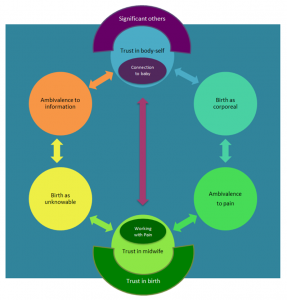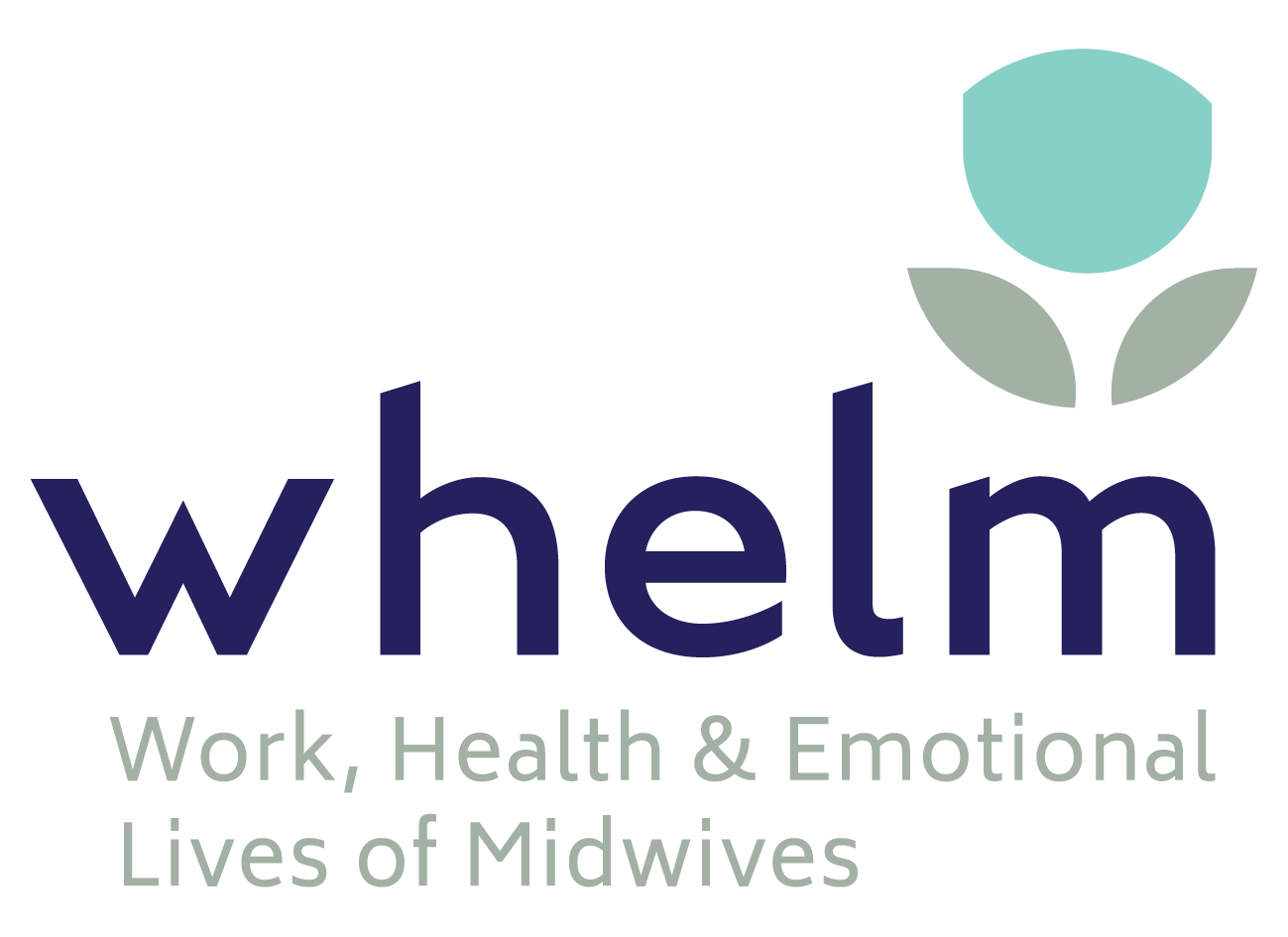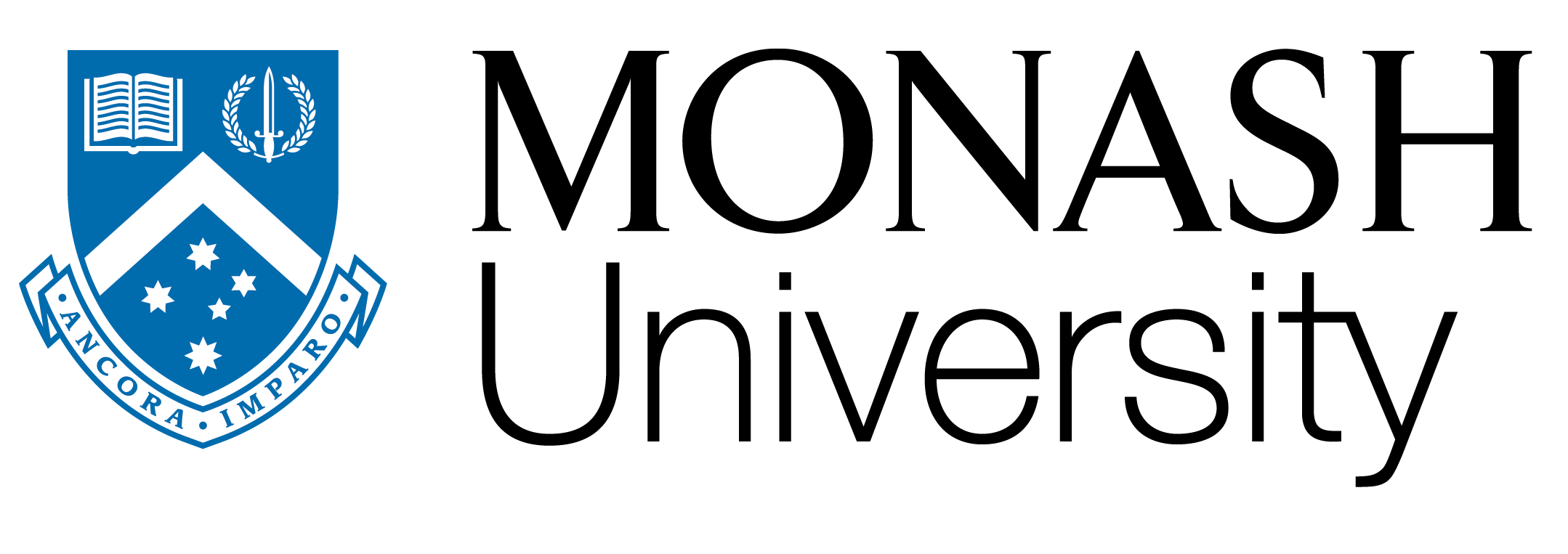Promoting physiological and humanised birth
This overall aim of this programme of research is to progress knowledge about the humanisation of childbirth. It consists of four main research strands: birth environment, birth physiology, birth ethics and birth technology.
This builds on the work from Dr. Newnham’s PhD – a critical ethnography of a hospital labour ward, with a focus on epidural analgesia.
Two theoretical concepts derived from this work are the Paradox of the institution (figure 1) and the Circle of trust (figure 2).
Figure 1 Paradox of the institution

Figure 2 Circle of Trust

Publications: Newnham E, McKellar L & Pincombe J 2018. Towards the humanisation of birth: A study of epidural analgesia and hospital birth culture. Palgrave Macmillan, Basingstoke.
Newnham, E, McKellar, L & Pincombe, J 2017. ‘It’s your body, but…’ Mixed messages in childbirth education: findings from a hospital ethnography, Midwifery 55: 53–59. https://doi.org/10.1016/j.midw.2017.09.003
Newnham, E, McKellar, L & Pincombe, J 2017. Paradox of the institution: findings from a hospital labour ward ethnography, BMC Pregnancy and Childbirth 17(1): 2-11. https://doi.org/10.1186/s12884-016-1193-4
Newnham E, McKellar L & Pincombe, J 2016. A critical literature review of epidural analgesia, Evidence Based Midwifery 14(1): 22-28.
Newnham E, McKellar L & Pincombe, J 2015. Documenting risk: A comparison of policy and information pamphlets for using epidural or water in labour, Women & Birth 28(3): 221-227. https://doi.org/10.1016/j.wombi.2015.01.012
Humanising Birth series for The Practising Midwife
Newnham E & Page L 2019. Humanisation of childbirth series article 1: The humanisation of childbirth. The Practising Midwife, 22(8): 14-17.
Newnham E 2019. Humanisation of childbirth series article 2: The circle of trust. The Practising Midwife, 22(9): 15-19.
Newnham E, Karlsdottir SI & Sanders, R 2019. Humanisation of childbirth series article 3: Re-envisaging labour pain – a humanistic approach. The Practising Midwife, 22(10): 14-17.
Newnham, E 2019. Humanisation of childbirth series article 4: The paradox of the institution. The Practising Midwife, 22(11): 16-19.
Newnham, E 2020. Humanisation of childbirth series article 5: Humanising policy – the curious case of epidural analgesia and water immersion. The Practising Midwife, 23(1): 14-17.
Newnham, E 2020. Humanisation of childbirth series article 6: Midwifery technology – Midwifery practice for the humanisation of birth. The Practising Midwife, 23(2): 14-17.
Bass, J., McKellar, L., & Newnham, E. Humanisation of childbirth series article 7: The role of critical pedagogy in midwifery education. The Practicing Midwife, 23(3).
Page, L., & Newnham, L. Humanisation of childbirth series article 8: Where do we go from here? The Practicing Midwife, 23(4).
Lead: Dr Elizabeth (Liz) Newnham
Contact
Study 1 – Exploring women’s views of labour pain: a collaborative research approach
Our aim is to further investigate women’s views about pain in labour, using a co-design research method, and based in the concepts of salutogenesis (focusing on factors that help create wellbeing) (Downe & McCourt 2008) and humanisation of birth (with its tenets of respect, relationship, embodiment) (Davis-Floyd, 2018) that focuses on these positive aspects of pain.
Publications to date: Newnham, E & Karlsdottir, IS. 2019. Exploring women’s views of labour pain: a collaborative research approach. Congress of the Nordic Federation of Midwives, Midwifery Across Borders. Harpa, Reykyavik, 2-4th May, Poster presentation.
Project Leads: Dr. Elizabeth (Liz) Newnham (Griffith University), Dr. Sigfridur Inga Karlsdottir (University of Akureyri), Prof. Jenny Gamble (Griffith University)
Other related publications/activities: Newnham E, Moran P, Carroll M, Begley C, Daly D. 2020. Comparison of outcomes between nulliparous women who used epidural analgesia in labour and those who did not: a prospective cohort study. Trinity Health and Education International Research Conference 2020, Dublin, Ireland 3-5th March, Oral presentation.
Newnham E. 2019. Bare Autonomy: Power and ethics in contemporary maternity care. Australian College of Midwives 22nd annual conference – Power, passion and politics, Canberra, Australia 17-19th September, Oral presentation.
Karlsdottir SI, Newnham E, Kristjansdottir H & Sanders R 2019. Decision-making around pain and its management during labour and birth. In E Jefford & J Jomeen (eds.) Empowering Decision-Making in Midwifery: A Global Perspective. Routledge, Abingdon.
Leap N, Newnham E, Karlsdottir I. 2019. Approaches to pain in labour: implications for midwifery practice. In S Downe & S Byrom (eds.) Squaring the Circle: researching normal childbirth in a technological world. Pinter and Martin, London.
Karlsdóttir, SI, Newnham, E & Leap N. 2019. How can midwives support women to work with pain in labour? Congress of the Nordic Federation of Midwives, Midwifery Across Borders, Harpa, Reykyavik, 2-4th May, Conference Workshop.
Newnham E & Kirkham M. 2019. Beyond autonomy: Care ethics for midwifery and the humanization of birth, Nursing Ethics 26(7-8):2147-2157. https://doi.org/10.1177/0969733018819119
Newnham, E. 2018. Women’s experiences of pain in labour: developing the case for a salutogenic approach to childbirth pain. COST Action BIRTH Conference – From Birth to Health: Towards Sustainable Childbirth, Lisbon, Portugal, 17-18th September, Oral presentation.
Newnham, E. 2018. The circle of trust: pain, embodiment and the midwife-women relationship in labour. Icelandic Association of Midwives National conference, Akureyri, Iceland, 5th May, Invited Keynote.
Newnham E. 2017. Ethics of care: a way towards humanised birth. Conference paper, Normal Labour and Birth Research Conference, University of Central Lancashire, Grange-over-Sands, UK, 2-4th October, Oral presentation.
Newnham E 2014. Birth control: Power/knowledge in the politics of birth, Health Sociology Review 23(3): 254-268. https://doi.org/10.1080/14461242.2014.11081978
Study 2 – Promoting respectful maternity care among nursing and midwifery students in Nepal: A multi methods approach
Childbirth is a special event to women and family members. During this period women need support, empathy, respect, and confidentiality. Respectful maternity care is essential for quality maternal health care and is a fundamental human right. However, women are experiencing disrespectful and abusive care during labour and childbirth globally. To reduce disrespect and abuse and promote respectful maternity care, various interventions have been done focusing staff working in maternity ward and women. Less focus has been given to nursing and midwifery students.
This study includes a systematic review on the quality of measures of respectful and disrespectful care during intrapartum period. Next we will undertake a scoping review on educational interventions or strategies to enhance respectful or dignified care by nurses and midwives. This will inform the development and validation of tool to measure student’s knowledge, attitudes, and respectful maternity care practices, undertaking a cross cultural comparison. Finally, the study will undertake the development, testing, and evaluation of an online educational module to enhance respectful maternity care knowledge, attitudes, and practices among nursing students of Nepal.
Co-Leads: Prativa Dhakal (PhD candidate), Professor Jenny Gamble, Professor Debra K. Creedy, and Dr Elizabeth Newnham
Publications
Dhakal, P., Gamble, J., Creedy, D.K., & Newnham, E. (2020). Quality of measures on respectful and disrespectful maternity care: A systematic review. Nursing & Health Sciences, in press. https://doi: 10.1111/nhs.12756







